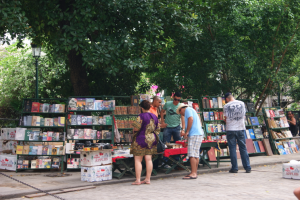Interview with a Bookseller in Havana Vieja
May 3, 2012 by admin
“Priceless libraries created over generations and libraries knocked together by upstarts; libraries specializing in the most profound, unusual themes and libraries made from birthday presents and wedding anniversaries — were all cruelly sacrificed by their owners on the pagan altar of financial necessity suddenly felt by the inhabitants of country were the shadow of death by starvation threaten almost every home.” Havana Fever (2009), Leonardo Padura pp. 14
In our tour of Havana Vieja, we came across the Plaza de Armas. The Plaza de Armas immediately caught my attention. Around the entire plaza, sellers had stalls set-up, selling books and sometimes vinyls. While tourists looked at the books, Cubans mingled around the plaza, selling snacks or just taking a stroll. The Plaza de Armas was where the city was originally founded in 1519. It is said that Spanish troops used this plaza to do military exercises, giving it the name of Plaza de Armas (http://www.cubaheritage.org/articles.asp?lID=1&artID=319).
On returning to Havana after our time traveling around Cuba, I had the opportunity to speak to a couple of booksellers, with one bookseller, a man in his thirties providing me with the most information. The bookseller told me how he mostly sold to tourist, citing the duel economy as a reason, with the cost of books being too expensive for most Cubans. The books were priced in CUCs (the Cuban convertible peso), ranging from 1CUC to up to 15CUCs. Cuban, he told me, mostly bought books from bookstores, which offers books of a more “practical” nature. He did mention that he sells some of the same books as bookstores, but did not get many Cuban buyers. 

Most of the books sold were about the about Cuba’s history, and specifically, the Cuban revolution, either written by Fidel Castro or Che, or were Spanish copies of Hemingway novels. I asked the bookseller how he got the books he sold. He told me that he bought the books from people who keep them during the revolution. While I think this is true (I even bought a magazine made in 1956), I also think that some of the books had to sold in mass to the booksellers in the plaza, since about ever stand I saw had the similar, if not the same selection of books about the revolution.
After answering my questions, the bookseller started asking me what books I liked. This led a discussion about some of Latin America’s greatest detective and realismo mágico novels, like Pedro Páramo by Juan Rulfo, and Crónica de una muerte anunciada by Gabriel García Márquez. We also discussed Cuban author Leonardo Padura Fuentes (whose book is quoted above) The bookseller told me to read his latest book El hombre que amaba a los perros (2009), which won the 2011 Prix Carbet de la Caraïbe et du Tout Monde (http://repeatingislands.com/2011/12/18/cuban-writer-leonardo-padura-wins-the-prix-carbet/). It felt so surreal to be discussing Latin American novels that I read for classes at Vassar College with a Cuban bookseller in Havana Vieja. I paid for my books, strolling to the next stall. The next stall had more books, with a larger supply of Spanish novels. I continued walking around the plaza, looking at all the books, wondering who had previously owned them and their stories.
Leave a Reply
You must be logged in to post a comment.

